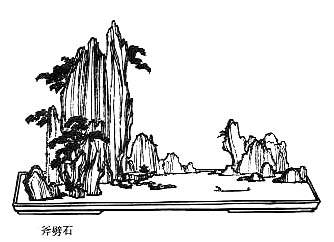論
語
Lun Yu 
 – The Analects of Confucius
– The Analects of Confucius
The Master discusses with his disciples and unveil his preoccupations with society. Tr. Legge (en), Lau (en) and Couvreur (fr).
Lunyu XVII. 1. (448)
Confucius's polite but dignified treatment of a powerful, but usurping and unworthy, officer.
1. Yang Ho wished to see Confucius, but Confucius would not go to see him. On this, he sent a present of a pig to Confucius, who, having chosen a time when Ho was not at home, went to pay his respects for the gift. He met him, however, on the way.
2. Ho said to Confucius, "Come, let me speak with you." He then asked, "Can he be called benevolent who keeps his jewel in his bosom, and leaves his country to confusion?" Confucius replied, "No." "Can he be called wise, who is anxious to be engaged in public employment, and yet is constantly losing the opportunity of being so?" Confucius again said, "No." "The days and months are passing away; the years do not wait for us." Confucius said, "Right; I will go into office."
Legge XVII.1.
Yang Huo wanted to see Confucius, and when Confucius refused to go and see him he sent Confucius a present of a piglet. Confucius had someone keep watch on Yang Huo's house, and went to pay his respects during his absence. -On the way he happened to meet Yang Huo who said to him, 'Come now. I will speak with you. Then he went on, 'Can the man be said to be benevolent who, while hoarding his treasure, allows the state to go astray? I should say not. Can the man be said to be wise who, while eager to take part in public life, constantly misses the opportunity? I should say not. The days and the months slip by. Time is not on our side.' Confucius said, 'All right. I shall take office.'
Lau [17:1]
Iang Houo désirait recevoir la visite de Confucius. Confucius n'étant pas allé le voir, Iang Houo lui envoya un jeune cochon. Confucius choisit le moment où Iang Houo n'était pas chez lui et alla à sa maison pour le saluer ; il le rencontra en chemin. Iang Houo dit à Confucius : « Viens, j'ai à te parler ! » Alors il lui dit : « Celui qui tient son trésor1 caché dans son sein et laisse son pays dans le trouble, mérite-t-il d'être appelé bienfaisant ? – Non », répondit Confucius. Iang Houo reprit : « Celui qui aime à gérer les affaires publiques et laisse souvent passer les occasions de le faire mérite-t-il d'être appelé prudent ? – Non », répondit Confucius. Iang Houo continua : « Les jours et les mois passent ; les années ne nous attendent pas. – Bien, répondit Confucius ; j'exercerai un emploi2. » Iang Houo, appelé aussi Hou, était intendant de la famille Ki. Il avait jeté dans les fers Ki Houan, le chef de cette famille, et gouvernait seul en maître la principauté de Lou. (Il avait ainsi rendu à son maître ce que Ki Ou, bisaïeul de celui-ci, avait fait au prince de Lou.) Il voulait déterminer Confucius a lui faire visite ; mais Confucius n'y alla pas. Lorsqu'un grand préfet envoyait un présent à un lettré, si le lettré n'était pas chez lui pour le recevoir, il devait, d'après les usages, aller à la maison du grand préfet présenter ses remerciements. Iang Houo, profitant d'un moment où Confucius n'était pas chez lui, lui envoya un jeune cochon en présent, afin de l'obliger à venir le saluer et lui faire visite. Confucius, choisissant aussi le moment ou Iang Houo était absent, alla à sa maison pour le remercier. Il craignait de tomber dans le piège que ce méchant homme lui avait tendu et de sembler reconnaître son pouvoir absolu ; et il voulait tenir sa première résolution, qui était de ne pas le voir. Contre son attente, il rencontra Iang Houo en chemin, Iang Houo, en critiquant la conduite de Confucius, et en l'engageant à accepter une charge sans délai, n'avait d'autre intention que d'obtenir son appui pour mettre le trouble dans le gouvernement. Confucius était tout disposé à exercer un emploi, mais non à se mettre au service de Iang Houo. (Tchou Hsi)
Couvreur XVII.1.

The Analects of Confucius – Lun Yu XVII. 1. (448) – Chinese on/off – Français/English
Alias the Lunyu, the Lun Yü, the Analects, les Entretiens du maître avec ses disciples.
The Book of Odes, The Analects, Great Learning, Doctrine of the Mean, Three-characters book, The Book of Changes, The Way and its Power, 300 Tang Poems, The Art of War, Thirty-Six Strategies
Welcome, help, notes, introduction, table.
Index – Contact – Top























